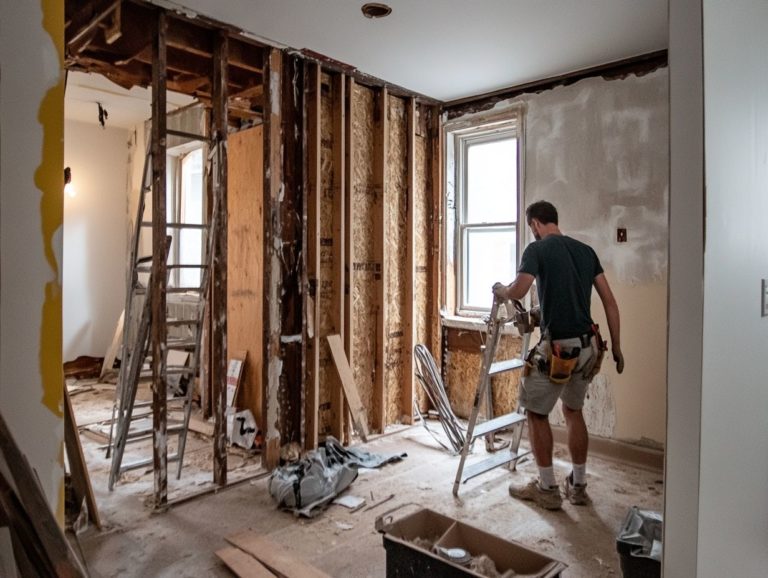How Does Home Insurance Work When You Move?
Moving to a new home is an exhilarating yet daunting experience, and understanding the role of home insurance in this journey is a must!
This article distills the essentials of home insurance, outlining what it covers, the various types of policies available, and how these aspects transform when you make the leap to a new property. You ll discover insights into coverage during your move, what steps to take regarding your existing policy, and valuable tips tailored for new homeowners.
By the end, you ll be thoroughly prepared to navigate your home insurance with ease during this significant life transition.
Contents
- Key Takeaways:
- Understanding Home Insurance
- Home Insurance and Moving
- Additional Considerations for Moving
- Tips for Managing Your Home Insurance During a Move
- Preguntas Frecuentes
- C mo Funciona el Seguro de Hogar Cuando Te Mud s?
- Se Transfiere Autom ticamente Mi Seguro de Hogar Cuando Me Mud ?
- Puedo Cancelar Mi Seguro de Hogar Cuando Me Mud ?
- Necesito Informar a Mi Proveedor de Seguros Cuando Me Mud ?
- Mis Primas Cambiar n Cuando Me Mud ?
- C mo Puedo Asegurarme de Que Mi Nuevo Hogar Est Debidamente Cubierto por el Seguro de Hogar?
Key Takeaways:

When moving, it’s important to understand the coverage provided by your home insurance policy. You may wonder if home insurance is transferable to new owners when moving to a new home. Talk to your insurance company and know your policy for proper coverage during and after your move.
Understanding Home Insurance
Understanding home insurance is crucial for homeowners, as it offers vital financial protection against damages to personal property, liability concerns, and unexpected events that can arise within the home. Your homeowners insurance policy typically includes several key components:
- Dwelling coverage that safeguards the structure of your home,
- Personal belongings coverage for your treasured items inside,
- Liability protection that covers any injuries that might occur to others on your property.
Work with a knowledgeable insurance agent to explore options and customize your policy to fit your needs.
What is Home Insurance?
Home insurance, commonly known as homeowners insurance, is your shield against financial loss resulting from damages to your property and liability claims. This type of insurance is essential for protecting one of the most significant investments you will ever make your home.
Coverage details can vary. However, most policies protect against events like fire, theft, or natural disasters, easing the financial burden of repairs or replacements.
Liability coverage is another key feature. It protects you from legal claims for injuries that occur on your property, including coverage for legal fees and medical expenses.
You’ll find a range of policy types, from HO-1 to HO-8, each tailored to meet different needs and circumstances. For instance, the HO-3 policy, which is the most popular choice, offers comprehensive coverage for both your dwelling and personal belongings.
It’s common for homeowners to have questions about specific events like flooding or earthquakes, which generally require separate, specialized policies. By understanding these options, you can select a plan that perfectly aligns with your unique situation.
Types of Coverage
Homeowners insurance offers a range of coverage options tailored to your needs, including damage protection for your home s structure, liability coverage for any injuries that may occur on your property, and additional protections specific to your homeowner’s policy.
Dwelling coverage typically safeguards against damages from events like fire or severe weather, ensuring your home remains secure. Meanwhile, personal property coverage protects your belongings everything from your furniture to your electronics against theft or natural disasters.
Liability coverage is particularly crucial; it protects you from legal claims stemming from accidents that happen on your property. You might also want to explore policies that ensure you receive full compensation for any loss. This not only enhances your financial security but also brings peace of mind in the ever-unpredictable realm of homeownership.
Home Insurance and Moving
When you re planning a move, grasping the nuances of how home insurance intersects with the moving process is essential. You need to consider specific moving coverage to safeguard your personal belongings during transit and ensure that you have adequate insurance options in place.
Moving insurance can offer an extra layer of protection that complements your homeowners insurance policy, especially if you’re enlisting the help of a moving company. This protection is crucial to shield your belongings from potential damage during your move!
This type of coverage can also simplify the insurance claims process should you encounter any loss or damage to your items.
Coverage During a Move

Coverage during a move often necessitates specific moving insurance to safeguard your personal property and reduce the chances of damage while your items are transported in a moving truck.
Understanding the various types of moving insurance is essential for anyone planning a successful relocation. Typically, there are two main types:
- Released value coverage: This option often comes at no additional cost, but it only covers a fraction of your item’s worth.
- Full value coverage: This option provides comprehensive protection for your belongings during transit.
It’s vital to understand how mover liability works, as this impacts the level of protection offered by the moving company. Documenting your belongings whether through photographs or an inventory list can significantly aid in the claims process if incidents arise.
Consider practical tips like labeling boxes and keeping essential items easily accessible to streamline your moving experience.
Transferring or Canceling Your Policy
When changing residences, carefully consider whether to transfer or cancel your insurance policy. This decision can significantly impact your coverage limits and overall insurance needs.
Contact your insurance agent as soon as you plan your move. They can provide valuable insights on the best course of action, ensuring a smooth transition.
Transferring the policy to your new property is often a viable option. However, be aware that it may result in changes to your premiums due to different risk factors associated with the new location.
Assess your current policy limits and coverage needs, as you might need to make adjustments during this process.
If you decide to cancel your existing policy, securing a new one in advance is crucial to prevent any gaps in coverage and safeguard you from potential risks.
Additional Considerations for Moving
When contemplating a move, recognize that considerations extend beyond mere logistics.
Homeowners should evaluate their insurance options to ensure they accurately reflect new circumstances. This includes factoring in the potential use of a storage unit for your belongings, which can significantly impact your coverage needs.
Updating Your Policy
Updating your policy is vital for homeowners, especially during a move. It ensures that all insurance requirements are met and that your coverage limits align with your new living situation.
Changes in your personal circumstances like acquiring new valuables or making significant home improvements can signal the need for a thorough policy review. Staying proactive is essential; neglecting to update your insurance could leave you exposed to gaps in coverage during unforeseen events.
Consider consulting with an insurance agent who can offer tailored recommendations based on your unique needs. This professional guidance can truly make a difference in maintaining comprehensive protection for your property.
Insurance for New Homeowners
As a new homeowner, choosing the right homeowners insurance means navigating various options to safeguard your personal belongings and meet your unique insurance needs.
Evaluate these choices carefully to ensure your policy covers not just the structure of your home but also everything inside it, from your beloved furniture to your prized electronics.
Understanding how selling your home might affect your chosen policy can help you avoid unexpected hurdles down the line.
When assessing different homeowners insurance options, consider the types of coverage available and compare quotes from multiple providers. Carefully examine deductibles and limits.
This thorough approach can lead you to a policy specifically tailored to your needs, providing vital financial protection against unforeseen circumstances.
Tips for Managing Your Home Insurance During a Move

Managing your home insurance during a move requires careful planning. Talk to your insurance provider to ensure your coverage fits your new situation.
It’s essential to ensure that your coverage types align with your new circumstances. Additionally, having a comprehensive understanding of your policy is critical.
Taking these steps will help safeguard your assets during this transition.
Communicating with Your Insurance Company
Effective communication is crucial during the moving process. It clarifies questions and ensures you get the right guidance from your insurance agent.
Carefully outline your policy details. Focus on what is covered during the move and any potential exclusions that could affect you.
It’s wise to ask about coverage for your valuable items. Consider whether you need additional insurance for high-value possessions.
Don’t hesitate to ask about claims procedures and timelines. This gives you a clear picture of what to expect should any issues arise.
By sharing details about your movers and the logistics involved, you help your insurance provider tailor coverage to your unique situation.
Engaging in this dialogue enhances your understanding and builds a strong rapport with your insurance representative.
Understanding Your Policy and Coverage
Understanding your homeowners insurance is key. It ensures your personal property is protected and meets policy limits.
Knowing the various components of your policy can make a significant difference in your coverage. This is especially important during a move when the risk of loss or damage is heightened.
Familiarize yourself with terms like dwelling coverage, liability protection, and personal property limits. This helps you navigate your policy confidently and assess your needs accurately.
Knowing the specifics of these limits is crucial. They dictate the maximum amount you can claim in unforeseen incidents, impacting your financial recovery during stressful times like relocating.
Preguntas Frecuentes
C mo Funciona el Seguro de Hogar Cuando Te Mud s?
El seguro de hogar funciona de manera diferente cuando te mud s. Tu cobertura cambiar dependiendo de tu nuevo hogar y del tipo de p liza que tengas.
Se Transfiere Autom ticamente Mi Seguro de Hogar Cuando Me Mud ?

No, tu seguro de hogar no se transfiere autom ticamente a tu nuevo hogar. Necesitar s actualizar tu p liza con tu proveedor de seguros para asegurarte de que tu nuevo hogar est debidamente cubierto.
Puedo Cancelar Mi Seguro de Hogar Cuando Me Mud ?
S , puedes cancelar tu seguro de hogar cuando te mud s. Sin embargo, no se recomienda. Es mejor transferir tu p liza a tu nuevo hogar o cambiar a una nueva p liza para evitar cualquier brecha en la cobertura.
Necesito Informar a Mi Proveedor de Seguros Cuando Me Mud ?
S , es importante informar a tu proveedor de seguros cuando te mud s. Necesitar n actualizar tu p liza con la informaci n de tu nuevo hogar y realizar los cambios necesarios en tu cobertura.
Mis Primas Cambiar n Cuando Me Mud ?
Tus primas pueden cambiar al mudarte. Factores como la ubicaci n, el valor de la vivienda y el monto de la cobertura pueden afectar el costo del seguro de hogar. Es mejor hablar con tu proveedor de seguros para entender c mo tu mudanza impactar tus primas.
C mo Puedo Asegurarme de Que Mi Nuevo Hogar Est Debidamente Cubierto por el Seguro de Hogar?
Para asegurarte de que tu nuevo hogar est debidamente cubierto, actualiza tu p liza con tu proveedor de seguros lo antes posible. Esto garantizar que se cubran los riesgos potenciales y te dar tranquilidad en tu nuevo hogar.





